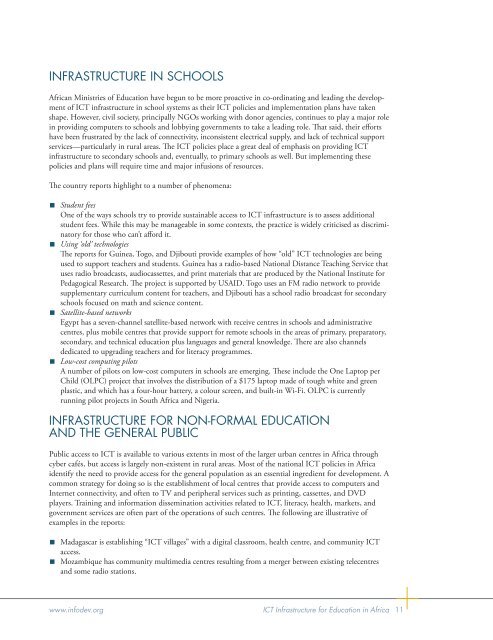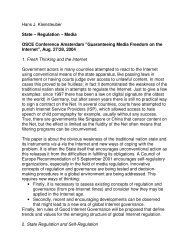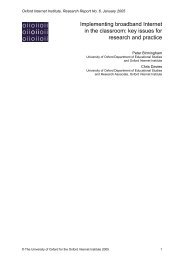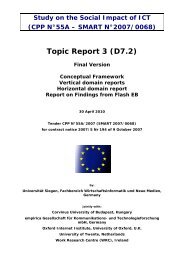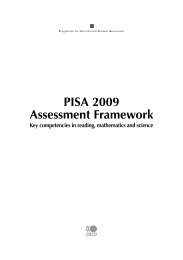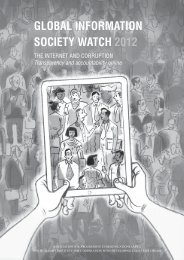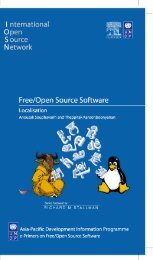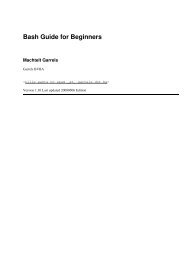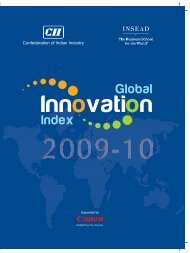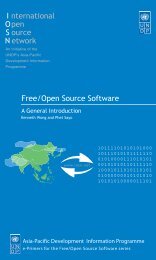SURVEY OF ICT AND EDUCATION IN AFRICA - infoDev
SURVEY OF ICT AND EDUCATION IN AFRICA - infoDev
SURVEY OF ICT AND EDUCATION IN AFRICA - infoDev
- No tags were found...
You also want an ePaper? Increase the reach of your titles
YUMPU automatically turns print PDFs into web optimized ePapers that Google loves.
Infrastructure in SchoolsAfrican Ministries of Education have begun to be more proactive in co-ordinating and leading the developmentof <strong>ICT</strong> infrastructure in school systems as their <strong>ICT</strong> policies and implementation plans have takenshape. However, civil society, principally NGOs working with donor agencies, continues to play a major rolein providing computers to schools and lobbying governments to take a leading role. That said, their effortshave been frustrated by the lack of connectivity, inconsistent electrical supply, and lack of technical supportservices—particularly in rural areas. The <strong>ICT</strong> policies place a great deal of emphasis on providing <strong>ICT</strong>infrastructure to secondary schools and, eventually, to primary schools as well. But implementing thesepolicies and plans will require time and major infusions of resources.The country reports highlight to a number of phenomena:nnnnStudent feesOne of the ways schools try to provide sustainable access to <strong>ICT</strong> infrastructure is to assess additionalstudent fees. While this may be manageable in some contexts, the practice is widely criticised as discriminatoryfor those who can’t afford it.Using ‘old’ technologiesThe reports for Guinea, Togo, and Djibouti provide examples of how “old” <strong>ICT</strong> technologies are beingused to support teachers and students. Guinea has a radio-based National Distance Teaching Service thatuses radio broadcasts, audiocassettes, and print materials that are produced by the National Institute forPedagogical Research. The project is supported by USAID. Togo uses an FM radio network to providesupplementary curriculum content for teachers, and Djibouti has a school radio broadcast for secondaryschools focused on math and science content.Satellite-based networksEgypt has a seven-channel satellite-based network with receive centres in schools and administrativecentres, plus mobile centres that provide support for remote schools in the areas of primary, preparatory,secondary, and technical education plus languages and general knowledge. There are also channelsdedicated to upgrading teachers and for literacy programmes.Low-cost computing pilotsA number of pilots on low-cost computers in schools are emerging. These include the One Laptop perChild (OLPC) project that involves the distribution of a $175 laptop made of tough white and greenplastic, and which has a four-hour battery, a colour screen, and built-in Wi-Fi. OLPC is currentlyrunning pilot projects in South Africa and Nigeria.Infrastructure for Non-formal Educationand the General PublicPublic access to <strong>ICT</strong> is available to various extents in most of the larger urban centres in Africa throughcyber cafés, but access is largely non-existent in rural areas. Most of the national <strong>ICT</strong> policies in Africaidentify the need to provide access for the general population as an essential ingredient for development. Acommon strategy for doing so is the establishment of local centres that provide access to computers andInternet connectivity, and often to TV and peripheral services such as printing, cassettes, and DVDplayers. Training and information dissemination activities related to <strong>ICT</strong>, literacy, health, markets, andgovernment services are often part of the operations of such centres. The following are illustrative ofexamples in the reports:nnMadagascar is establishing “<strong>ICT</strong> villages” with a digital classroom, health centre, and community <strong>ICT</strong>access.Mozambique has community multimedia centres resulting from a merger between existing telecentresand some radio stations.www.infodev.org <strong>ICT</strong> Infrastructure for Education in Africa 11


